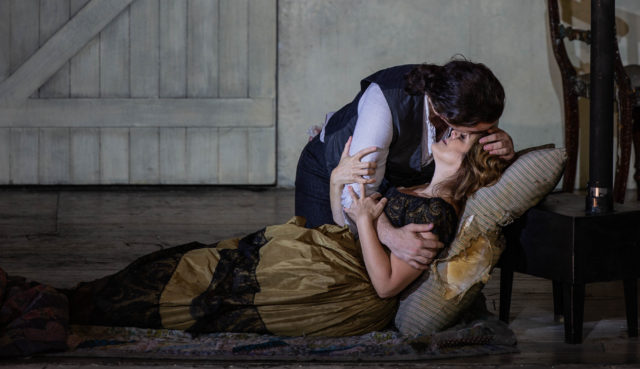Fueled by her affinity for Italian opera’s great tragic heroines, Maria Agresta recently returned to Chicago to play the role that launched her flourishing career.
With a candle in hand, a poor seamstress searching for a light enters the life of a poet in 19th century Paris. They fall in love, they spar, they reconcile, and finally they mourn a shared flame extinguished far too soon. It’s beautiful. It’s heartbreaking. It’s quintessential opera.
Giacomo Puccini’s “La bohème,” which first premiered in 1896, initially received tepid reviews. But the critics didn’t do much to halt the opera’s meteoric rise, and more than a century after its debut, it has emerged as one of the most popular operas of all time worldwide. Featuring a score and story line that pierces the heart and consistently captivates audiences, it’s a grab-the-Kleenex, gut-punch love story whose music permeates pop culture to this day and whose core DNA can be found in countless reincarnations, including the Broadway musical “Rent.”
For all of the iterations it has spawned, Puccini’s sweeping account of the tragic love between bohemians Mimì and Rodolfo comes most profoundly alive on stage in its original operatic form. And if you were fortunate enough to catch the Lyric Opera of Chicago’s sumptuous revival of “La bohème” in October 2018 and January 2019, you would have experienced opera star Maria Agresta’s thrilling embodiment of Puccini’s Mimì in a knockout performance for the ages.
“One could go a lifetime and never encounter a more moving performance of Mimì than that given by Maria Agresta Saturday night,” Lawrence A. Johnson of Chicago Classical Review wrote of the soprano’s October run at the Lyric. “The final scene was so affecting, so beautifully sung and realistically acted by Agresta, you could put it on film. She made Mimì’s last moments almost unbearably heartbreaking, even to the professional cynics in the audience.”
Hailing from Vallo della Lucania and trained at the Conservatorio Giuseppe Martucci in Salerno, Italy, Agresta made her operatic debut in 2007, playing Mimì at the Teatro Nuovo in Perugia. Over the intervening years, she’s built a formidable career in storied opera houses around the world, singing the works of Verdi, Mozart and Bellini, to name a few. But there’s perfection in the marriage between this powerhouse soprano and the role of Mimì, which she has brought to life in more than a dozen productions over the past 20 years. For the 40-year-old Agresta, it’s a match made in heaven between singer and subject.
“Mimì is still one of my favorite roles, and I have sung it more often than any other,” Agresta told Fra Noi in an interview. “The first time I performed it, I worked very, very hard, both on the music and on the characterization, because I was aware of how iconic Mimì is. I felt I had a responsibility to convey to the audience the very emotions Puccini was expressing in the music with absolute fidelity to the musical text, paring them down to their essence.”
The Lyric’s interpretation, directed by Richard Jones, strips away much of the excess of previous productions, allowing the music and singers to come to the fore. Agresta seized the opportunity, imbuing Mimì with vulnerability, innocence and pathos.
“I sang in this same production in London at [The Royal Opera House] Covent Garden and got to know [director] Richard Jones well,” Agresta says. “I loved his approach from the very beginning. With the linearity and sparseness of the set design, he leaves full flow to the emotions of the music and exposes the souls of the characters.”
Agresta’s path to opera stardom began at an early age. Although she didn’t grow up with musicians in the home, Agresta says her family listened to a lot of music and radio during her formative years. The singer also found inspiration in her town’s festa band, which would stroll through the streets and play during the Feast of San Pantaleo, the patron saint of her hometown.
“I was fascinated that the musicians could play so well while walking!” she says.
But it was a fateful school trip to Teatro di San Carlo in Naples that sealed the deal and galvanized a young Agresta’s love of opera.
“My impression on entering the theater—with its lights and the nobility and grandeur of its architecture—was one of overwhelming emotion. I started to cry, to the amusement and even mockery of my fellow students,” Agresta says. “Then there was the [Mascagni] opera ‘Cavalleria Rusticana.’ I knew then that opera and its world were going to be my world and my life.”
Like so many opera singers in the past 70 years, Agresta was inspired by the siren song of operatic legend and fellow soprano Maria Callas. Agresta vividly remembers hearing Callas’ searing voice on records as a child. Years later, Agresta herself stepped into the role the late Callas defined for a generation, playing Bellini’s Norma in productions from Italy to Israel.
Agresta’s musicality and sumptuous tone has garnered well-deserved critical acclaim and a host of awards over the years, including the prestigious Franco Abbiati Prize for Best Soprano in 2014. And while she has dabbled in comedic roles, including Rosina in “The Barber of Seville,” Agresta says she feels most at home discovering the beauty in tragedy.
“Because of the timbre of my voice and also because of my temperament, I feel more suited to interpret dramatic roles, which more often than not have tragic epilogues,” she says.
While Agresta has become highly sought after for her interpretations of the Verdian sirens in “Il Trovatore” “La Traviata,” and “Othello,” there’s a soft spot in her heart for Puccini’s tragic heroines.
“I love playing Verdi roles. I feel that they’re good for my voice, and I enjoy the difference in style and interpretation they require,” she says. “But Puccini’ s heroines are closer to us in time and sensibility. They express their emotions in a less musically sophisticated way perhaps, but one that is completely free and unfiltered.”
When not meeting her tragic end on stage, Agresta extends her artistry to the kitchen, where she is regarded as a formidable chef. In fact, while performing the role of Micaela in The Met’s production of “Carmen,” Agresta partnered with chef Richard Diamonte of The Grand Tier Restaurant in New York City to create a three-course pop-up menu.
Agresta credits her love of cooking to her mother, who made her a sous-chef even before she could reach the stove. And, like music, Agresta believes good food has a way of bringing people together.
“One of the reasons I love cooking is its conviviality,” she says. “Nothing says conviviality like the gathering of friends and family around a table for a good meal cooked by you.”
Questions crafted and article edited by Arielle Basile. Interview conducted in Italian and translated into English by Marina Vecci.
The above appears in the March 2019 issue of the print version of Fra Noi. Our gorgeous, monthly magazine contains a veritable feast of news and views, profiles and features, entertainment and culture. To subscribe, click here.
 Fra Noi Embrace Your Inner Italian
Fra Noi Embrace Your Inner Italian








